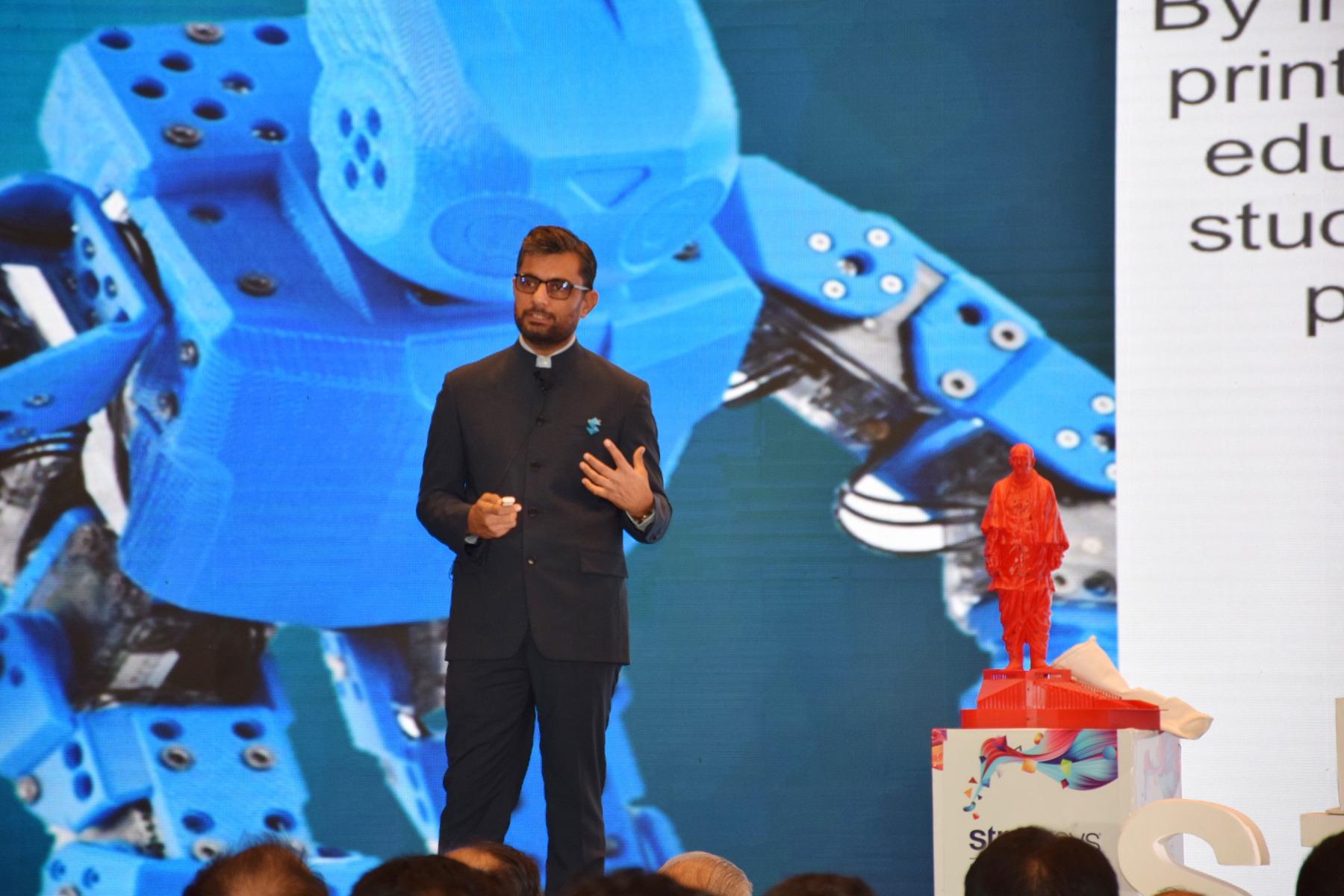“Today, we are both a software and a hardware company”
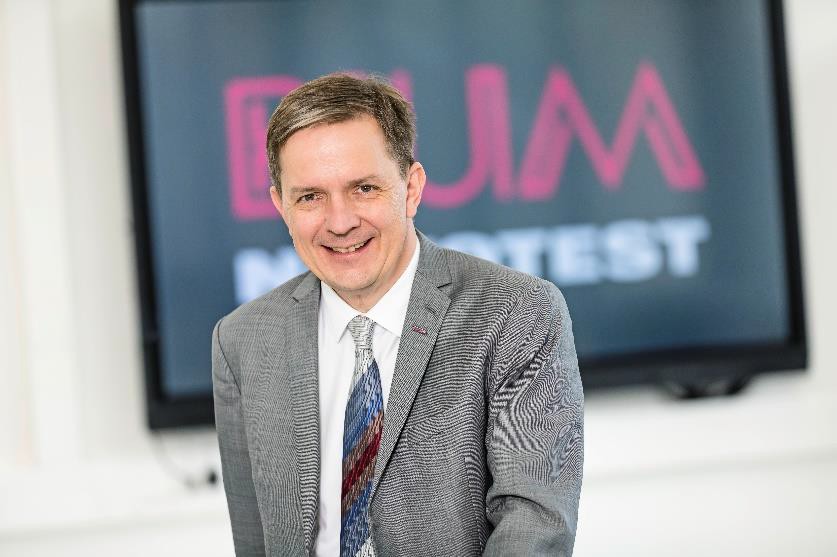
Alexander Blum on the subject of Corona, Digitalisation and Technology
Whilst the Corona pandemic continues to occupy the world in varying degrees, the increasing number of vaccinations offers a ray of hope on the horizon. The current crisis also poses a challenge for a measuring and testing technology company such as Blum-Novotest, based in Ravensburg, Germany. In this interview, Managing Director Alexander Blum shares his experiences and his view for the future. He is convinced: Family-run businesses are more circumspect and survive better in times of crisis than other companies.
Mr Blum, what is your view, as an entrepreneur, on the Corona pandemic?
Corona confronted us with a somewhat unusual economic crisis. Moreover, for the machine tool industry – like the 2008/2009 financial crisis – it coincided with the early phase of a structural crisis. The additional pressure has intensified, but also accelerated the structural crisis. In this respect, there is a positive aspect to such crises, because they accelerate the necessary process of change and lead to a quicker recovery after the crisis.
You could say that the financial crisis was a training camp for the current situation. We introduced measures such as short-time work during the financial crisis, and we are also familiar with the relevant financial figures. The difference is what I would like to call an “externally-driven reduction of costs”. In addition to the fact that we drew up our own cost-cutting programmes, as we did in 2008/09, this time, the crisis itself brought savings – trade fairs were cancelled, business travel was not possible. Unlike in 2009, we had put some of our sales staff on short-time work – which at first sight is counterproductive, because in times of crisis, you should really be trying to sell as much as you can. But when your sales staff can’t travel to visit customers, that’s simply not possible.
However, what this crisis did was provide the opportunity to invest the additional money and hours we saved more heavily in future topics. We restructured our research division and the administration. In both areas, we merged various groups, which we are confident will optimise our communication and allow us to exploit various synergies. Furthermore, even in the midst of this crisis, – and as part of our responsibility for the future – we installed a 208 kWp photovoltaic system with the capacity to supply over 100 households.
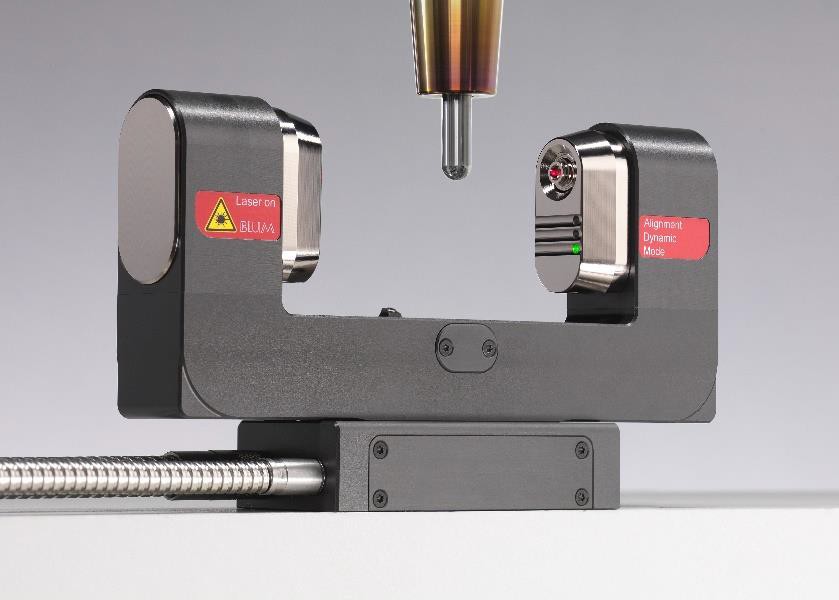
With solutions from Blum-Novotest, the quality of motor spindles in machining centres can be documented over their entire service life. The widely known LC50-DIGILOG laser measuring system is used to monitor the spindles in the machine.
So you can see light at the end of the tunnel?
Definitely! The Chinese market has been recovering over the past quarters. China was our most important growth market last year. For some time, we have also been seeing positive development on several other markets worldwide, so I am generally optimistic. Nevertheless, some markets in Europe face a not insignificant structural crisis in the post-Covid period.
To Keep Manufacturing Within the country ,many companies have begun to develop and offer more comprehensive solutions instead of individual products. Companies are also switching to higher-quality products in the hope that purchasing decisions will be based on the ability to deal with complexity and on quality rather than on the price. Correspondingly, production is increasingly being transferred to countries with lower wage levels, although these are usually not as far away as before, but in the respective sales region, for example Mexico, Romania or Vietnam. Automation is definitely an important success factor, and this applies in the so-called low-wage countries, too, where wages are of course also rising and where it is important to produce goods of consistently high quality. In such countries, consistent quality is often the decisive factor behind increasing automation.
Many companies all over the world, from the USA and China to Mexico and Romania, have a lot of catching up to do when it comes to automation. Our measuring components are an integral part of this process of automation, which is giving us additional impetus. The market in Romania, for example, was so wide open that our operations there reached the break-even point almost immediately.
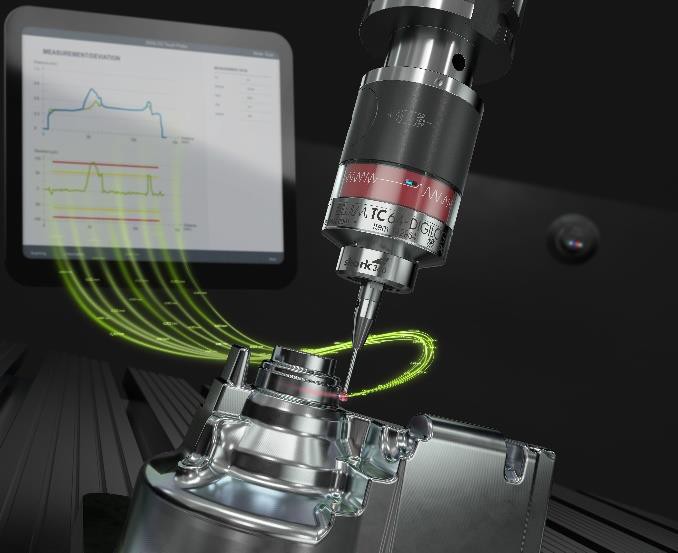
DIGILOG technology from BLUM also offers a wide range of new options, for example scanning measurement in machine tools. And the manufacturer also supplies the matching evaluation software BCS 3.0.
How has BLUM mastered the crisis so far?
We survived the 2008/09 crisis without downsizing, and during its final phase, we even began to expand our international network. Some years ago, we established a network of qualified personnel wherever in the world we have customers, expert personnel who can not only advise them on-site and support customer processes with their know-how but can also carry out all installation work.
The fact that we invested heavily in digitalisation also paid off during the current crisis. It allowed us to send as many employees as possible to work from home. Since 2010, we have established our own video conferencing network, and we successfully switched to an integrated ERP system 18 months before the crisis struck. And by the way, even at the height of the pandemic, we were able to adhere to our international rollout schedule with the go-live of the ERP system in Italy in July 2020. It was achieved completely via remote access and remote sessions for configuration and training.
In the Novotest division, which develops and manufactures complex test stand systems, we completed all scheduled installations worldwide in spite of the restrictions on travel. Via remote access to the customer sites in Brazil, China or elsewhere were able to instruct our local colleagues in the subsidiaries and complete the projects to the full satisfaction of our customers.
Would you say that as the owner of a family-run enterprise, you are able to implement major changes such as digitalisation faster than this is possible in other companies?
Nothing is “waved through in a hurry” at Blum-Novotest. For more than 20 years, I have managed the company in cooperation with the staff. During the crisis, however, it is noticeable that employees feel the need for stronger guidance and support. And it is definitely easier to convey security as the head of a family-run company than as a hired manager. As Managing Director of a family business, I can also offer the long-term perspective employees need. We know very well that we will need every employee once the economy picks up again, and so we are doing everything we can to keep the team together during the crisis.
As the head of a family-run business, I also have the advantage of only having to justify my decisions to myself and my associates, which means that I can often react very quickly. Our workforce know that when BLUM states that our employees are the company’s most important asset, these are not just empty words. Those who have been with us longer have experienced for themselves how we react in a crisis, and they reassure those who were hired more recently. This keeps motivation high and maintains confidence.
Has the crisis affected product development?
We have not cut back in product development, and in October, we presented ten new products, four of them global innovations. Working from home gave our developers more peace and quiet to concentrate on their work. On the other hand, they did miss the informal communication which is so important in the field of development and which drives the solution-finding process within a team. These two effects more or less cancel each other out. The current situation has shown us all once again how important close communication within a team is for creative work. And it has also helped us to organise our work better in future.
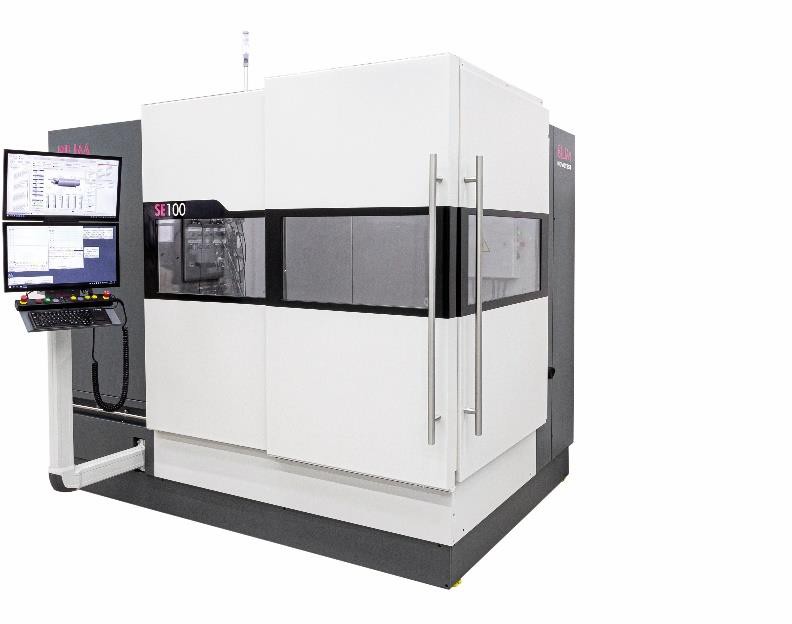
But you started the digitalisation of your company long before the crisis, didn’t you?
Of course we did. Including, for example, in the field of further training – three years ago, we launched our T&Q (Training and Qualification) programme for in-house and external further training. Even before Corona, new employees from other countries received initial training via video and self-learning platforms before coming here to Grünkraut. All training courses are now available online on the T&Q platform – and in very many languages.
For our customers, we also transferred our well-known Tech-Talks to the virtual realm, where we offer short workshops, 10-15 minutes in length, on complex technical subjects. They are extremely popular. Here, we pass on concentrated product and application know-how to our customers. For example, one “Tech-Talk online” presented the new possibilities offered by laser measurement using Digilog technology, others covered scanning measurement or automated roughness measurement in the machining centre.
Most trade fairs have been cancelled. How do you manage to stay in contact with your customers?
In addition to our “TECH-TALK online” webinars and the usual options, namely video conferences, e-mail and telephone, we held an in-house fair last autumn. For this TECH-TALK, the entire premises of the company became one huge trade fair booth, ensuring compliance with the social distancing requirements. It was extremely successful, and visitors were particularly interested in our own production lines. We were able to demonstrate how much care and attention we devote to production and how we use our own products in manufacturing.
This was a hybrid event. We also streamed some content. As employees from a major machinery manufacturer were unable to attend due to the travel restrictions, we streamed the event online with a presenter, and it was a huge success.
Is this a format you will be using in future, post-Corona?
Very definitely! Streaming real events is becoming increasingly popular, as it allows customers who are unwilling or unable to travel to our premises to take part. It has to be said, however, that such an in- house event is no substitute for a trade fair. At a trade fair, visitors are interested in gathering information, finding out about new products and making contacts, all without obligation. On the other hand, a pure transfer of know-how also works excellently online. In the end, the current pandemic shows just how important direct personal contact is to all of us.

What are the plans for the future in product development at BLUM? What signals are coming from the market?
Our customers are in the same situation we are. They have taken advantage of the crisis to optimise and evaluate their processes. We are seeing growing demand for our Digilog technology, and scanning measurement is increasingly used and applied to optimise manufacturing processes. For example, contour deviations or the roughness of a workpiece can be measured after machining and the process optimised based on the results of the measurement – without having to transport the workpiece to a measuring room.
Our developments are not tailored to trends, and we don’t limit them to areas where we can achieve mass unit volumes for a brief period. We develop based on the requirements of our customers. And that is the mega topic in production – the automation of small production batches. If we can offer inexpensive, simple automation, we are also influencing the customer’s decision on whether to continue to manufacture in-house or to outsource production. In order to keep production in-house, companies need, for example, simple, flexible handling solutions and simple programming. From bar feeder to cobot, so to speak.
And this development has an influence on our products. They need to be even easier to incorporate into automated production lines, easy to integrate into the process and easy to operate. Here, we are positioning ourselves increasingly broadly for our customers. A good example of this is our spindle testing and measurement technology. We offer test stands from laboratory test stands for spindle development to end-of-line test stands for production right through to spindle monitoring in the machine.
One of our innovations is the PSC – Portable Spindle Control – a system for testing spindles in the machine. A BLUM laser measuring system is attached in the working area of the machine using magnetic holders. The concentricity and vibration of the spindle are measured and can be directly evaluated on a connected laptop computer. Even better – customers who use our latest LC50-DIGILOG laser measuring systems in their machines in combination with the visualisation and evaluation software LC-VISION can carry out such measurements directly and need no additional measuring system to test their spindles.
The PSC system was designed for spindle maintenance firms and companies which have large machinery parks and want to test their machine tool spindles regularly. The exciting feature of this new product – in addition to its high-precision laser technology – is that it is primarily software-based! BLUM is now both a software and hardware company, a development which our founders could never have foreseen all those years ago, but which shows just how much the world has changed.
How do you respond to these changes?
This is a process based on a well-thought out and long-term strategy. And, of course, also on innovative measuring technology, premium hardware and electronics. In addition, the company needs to be able to embed this hardware cleanly in comprehensive software products with clear and simple interfaces in order to create a new product which generates added value for the user.
And then it is not simply a matter of producing endless data, but of interpreting and preparing this data in such a way that the user can work with the information. The user needs clear information and instructions because the spindle is the most important element of the machine tool for the customer.
How do you see the general development in the future?
I am absolutely certain that by the beginning of the next decade, there will be practically no scrap in state-of-the-art production plants, except when something unexpected happens, for example tool breakage. In the near future, machine tools will be able to compensate for and thus prevent imprecisions arising from geometric deficiencies or thermal changes during the process. And Blum-Novotest will supply the technology that makes this possible.
Blum-Novotest GmbH
Established in 1968 and based in Ravensburg, Germany, Blum-Novotest GmbH is a global leader in the manufacture of high-quality measuring and testing technology for the international machine tool, aerospace and automotive industries. Today, the family-run enterprise employs roughly 600 people at a total of nine sites in Europe as well as in the USA, Mexico, Brazil, China, Japan, Taiwan, Singapore, Korea, India and Thailand. Blum-Novotest’s highly trained system integrators and regional sales offices guarantee a comprehensive sales and service network that supports Blum products in use throughout the world. www.blum-novotest.com


